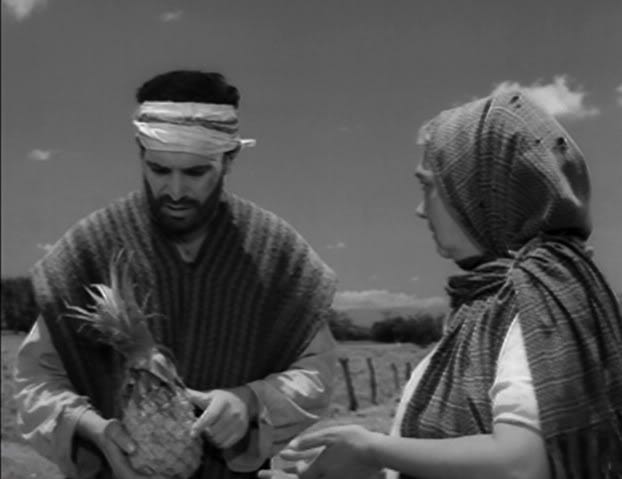Pineapple Slices 9: The weakening eye
Readers, pineapples, lonely hearts, links, endings, beginnings
Dear Reader,
An afterparty following a edgy panel event in East London. I find myself chatting to a good-natured, articulate Zoomer. “I subscribe to Dan Hitchens’ newsletter,” he tells me, quickly adding: “for the prose”. Can I recommend this formulation to all readers who want to advertise the Pineapple without associating themselves with the dubious opinions rehearsed here?
Thank you, too, to reader Fr Michael Ward, who continues to carry out important research on the global significance of the pineapple. He notes that in the 1959 film Nazarín (featured in a recent essay collection co-authored by Fr Ward), the clerical protagonist “has many misadventures as he attempts to do good for people.” Finally, he allows someone else to do him a good turn: a fruit seller offers him a pineapple, saying: “Take this charity, and may God be with you.” Fr Nazario twice tries to refuse, but then accepts the pineapple with the words: “May God repay you, Madam.”
Fr Ward also points out that in Spain, a new craze has single Spaniards seeking love by going to the supermarket Mercadona between 7pm and 8pm and placing an upside-down pineapple in their shopping trolley. The BBC quotes the Spanish commentator Susana Quadrado as saying that “Pineapple-gate” has generated many “jokes and childishness.” Quadrado warned that “the virtual world ‘can condition social behaviour and turn users into loudspeakers for free’.”
On that point, since my last update I have reviewed a mediocre film set amid a papal conclave, a charming memoir of a diplomatic life, and a fine biography of the priest-satirist Fr Paul Mankowski. I wrote about Christianity’s simultaneous political eclipse and cultural sunrise; about Keir Starmer’s atheism; and about the crisis facing small religious schools.
Two long essays punctuated this unexpectedly churchy cuttings-book. For First Things I paid tribute to the astonishing Iain McGilchrist, who – seriously – may be the man to catapult us into a new intellectual era. And for The Critic I had fun reconstructing Roger Scruton’s 70s milieu – the pubs, salons and common rooms where a shy young academic began to think his mighty thoughts.
Meanwhile there are four or five months to arrest the progress of Britain’s assisted suicide bill through the Commons. (Though even if it sneaks through the lower house it could capsize in the Lords.) The best two things written on the subject were Thomas Chacko’s pulverising analysis of the safeguards and Sarah McCulloch’s imagined narrative of the NHS as a suicide provider. My own contributions appeared in UnHerd on the misconceptions around lethal drugs, in First Things on the politics of fear, in The Critic on the hard questions the media failed to ask Kim Leadbeater, in Compact on the assisted suicide campaigners’ flight from reality, and in the Telegraph on whether Parliament has the means to protect itself from a blizzard of untruths.
The definitive New Year’s poem is, obviously, Thomas Hardy’s A Darkling Thrush:
I leant upon a coppice gate
When Frost was spectre-grey,
And Winter's dregs made desolate
The weakening eye of day…
in which Hardy, writing of the last days of the nineteenth century, conjures a sense of an ending – of the age he has known, with all its assumptions, fading speedily into the darkness. This, too, felt like a year of endings. The end of the post-Cold War era. Of normality. Of Tory England. Of wokeness, perhaps. Of America’s liberal left, as we have known it. Of Bashar al-Assad. Of popular politicians. Of the mainstream. Of – more niche, but momentous for those of us who owe him – Fraser Nelson’s tenure as Spectator editor. Of – nicher still – me writing a book.
The land's sharp features seemed to be
The Century's corpse outleant,
His crypt the cloudy canopy,
The wind his death-lament.
The greatness of the poem is that the speaker lets himself be carried away by a feeling which does not belong in this landscape, or in Hardy’s grim philosophy. He lets in, out of nowhere, a song of joy. I wish you all something similar in 2025.
Photo: “The tangled bine-stems scored the sky like strings of broken lyres”, Giles Watson (Flickr)


